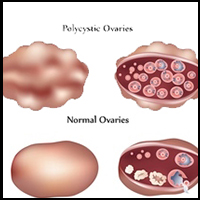POCD stands for polycystic ovary syndrome it is a disease related to ovary found in females. Ovaries are the pair of gland, which produces eggs named as ova in females. The glands are found at the either sides of uterus. At the ovary there found swelling called follicle. In normal women these follicles are keep on producing every month, which later develops into ovum. It can also found the ovaries found in women also produce different hormones out of which the main hormone is oestrogen. The women suffering from POCD often complain about missing of their periods, which occurs every month.

It can be found cysts are formed on the ovaries made of follicles as the development of follicles is more than usual; therefore, women suffering from the disease miss their periods. In some women missing of periods is regular problem but in some cases it can be also found irregular periods occur. As we know without the release of mature ovum a woman can go through many physical complications. However, the major problem from which most of women suffer is obesity and diabetes. Further, there are also chances of falling prey of high blood pressure and at times even heart failure. Due to this disease even women unable to get pregnant due to which their loss their self esteem and confidence.
The common symptoms of POCD are irregular periods, excess weight gain, acne problems, excess growth of hair on body and face, thin scalps of hair, and infertility. There are several treatments available for the disease but if we talk about safe treatment without any side effect then homeopathy will be always recommended. Vira’s Homeopathy Clinic is best in treating POCD and we have admirable record in treating the disease. We do single test to diagnose the disease before recommending medication to patients.
There are a number of symptoms associated with the syndrome:
- Absent or irregular periods
- Weight gain
- Acne (spotty skin)
- Hirsutism (excessive hair growth on the face and body)
- Difficulties getting pregnant
- Thinning of scalp hair
Not all people who suffer from polycystic ovary syndrome will have all of these symptoms. Different women have different symptoms, and in differing levels of severity. Also, individuals may find that they have different symptoms at different times in their life. Symptoms usually develop around the late teens and early twenties. For some women, however, the only sign that they have the condition is when they have difficulties when they come to have children.
As well as the symptoms listed above, polycystic ovary syndrome has been found to be associated with other health problems and illness.
Women with this condition have a higher risk of developing type 2 diabetes, or developing diabetes during pregnancy. Around 10% of women with polycystic ovary syndrome will at some point develop diabetes. Having diabetes then increases the risk of strokes and heart disease. As well as diabetes, polycystic ovary syndrome also increases the risk of high cholesterol and possibly high blood pressure. These problems are caused by insulin resistance and obesity, both of which are associated with polycystic ovary syndrome.
Additionally, having infrequent periods may possibly increase the risk of developing cancer of the womb. The research in this area is ongoing, and if there is an increased risk it is likely to be very small.
A condition known as sleep apnoea is also more common in women with polycystic ovary syndrome.
Women who suffer from polycystic ovary syndrome can often develop depression or poor self esteem because of the effect of the other symptoms of the condition.
The actual cause of polycystic ovary syndrome is unknown; however current knowledge about the disease suggests that there are many factors that are important.
There is a tendency for polycystic ovary syndrome to be more common in people who have a close relative with the condition. The fact that the condition can run in families suggests that there is a genetic component to the disease.
There seems to be evidence linking polycystic ovary syndrome with higher than normal levels of a hormone known as insulin. Insulin is a hormone that controls blood sugar levels. A lot of women with polycystic ovary syndrome have a problem known as insulin resistance. If somebody has insulin resistance they need higher levels of insulin to be released to control their blood sugar. This means their body is exposed to higher amounts of insulin than other people. One of the effects of these high levels of insulin is that the ovaries make too much testosterone. The high levels of testosterone are responsible for some of the symptoms of polycystic ovary syndrome, including acne and excess hair.
If you are overweight, this can worsen the problem. This is because having excess body fat also makes insulin resistance worse, and so the levels of insulin in the body are increased even more.
Another hormone known as luteinising hormone is also raised in some women with polycystic ovary syndrome. Luteinising hormone also increases levels of testosterone in the body.
Polycystic ovary syndrome cannot be diagnosed by a single test. Your doctor will consider your symptoms and carry out a range of tests to try and establish if your symptoms are being caused by polycystic ovary syndrome. Some of these tests may be carried out by a specialist such as an endocrinologist, who is a specialist in hormonal problems, or a gynaecologist, who is a specialist in women’s reproductive health.
Common tests for polycystic ovary syndrome include:
- Blood tests. These are used to measure levels of hormones, including testosterone and luteinising hormone. This can also help to rule out alternative hormone problems that might cause periods to stop.
- Ultrasound scan. This scan is done to look at the surface of the ovaries. This will show whether the ovaries are enlarged and polycystic.

